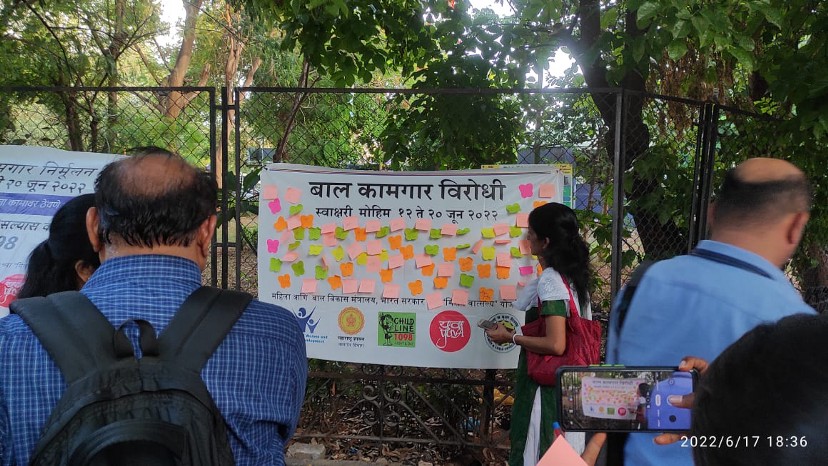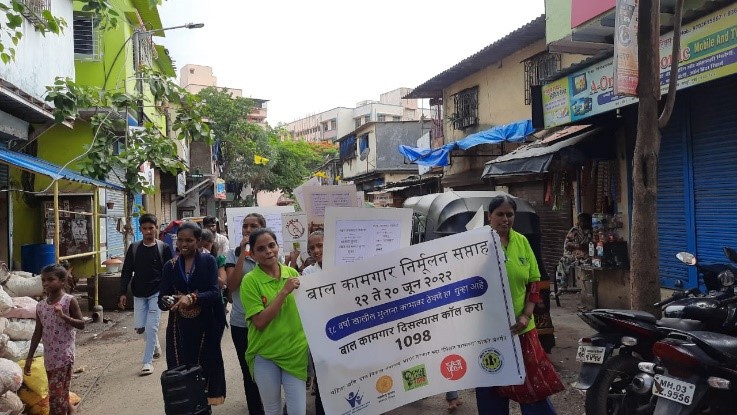‘Child labour’ deprives children of more than just their ‘childhood’. It takes away from them their dignity and potential for a bright future. Child labour, in its most extreme forms, involves children being exposed to hazards, enslaved and/or left alone on the streets of big cities like Mumbai. It is a violation of fundamental human rights and it hinders the growth of an entire nation.
Reducing child labour is one of the significant challenges that India faces today. As per Census 2011, 3.9 per cent of the total child population (10.1 million) is involved in child labour. The Government of India has formulated several laws to prevent child labour, but their implementation often falls short. This is often due to gaps that exist, from lack of awareness and sensitivity among masses and stakeholders at different levels, to inadequate resources and the lack of trained staff to address issues on ground.
Civil society organisations work between these lines to fill in the gaps and bridge the divide between policies and its implementation. They often do this work collaboratively, such as via the national ‘Campaign Against Child Labour’ which seeks to address the question of child labour at the systemic level.
At the organisational level, YUVA Urban Initiatives has been working to protect the rights of children. Especially through the CHILDLINE, 24-hour toll-free national emergency call service for children in distress, the team works to protect and rehabilitate children from adverse situations.
The team recently observed ‘World Day Against Child Labour’ through a detailed campaign that travelled across suburban Mumbai and Navi Mumbai (such as in Kurla, Dadar, Vashi station, Airoli, and Nerul station). The campaign was well aligned with the team’s larger objectives to spread awareness on child rights, including child labour, domestic child labour, and to do this in high density areas and reach the public at large.
Through the campaign, drawing competitions, street plays and rallies were organised to sensitise children and adults and to educate them about child rights. Signature campaigns were organised, videos about child rights were shown, and discussions with youth and adults took place. The team also shared about the 1098 helpline number, which can be used to report cases of child labour.

An initiative like this is needed in India since there is such a high prevalence of child labour. Children from marginalised backgrounds are forced to work from a young age, depriving them of childhood and education. Our team aims to educate the people about the same and make systemic authorities more accountable. Currently, most people do not know about existing services, such as the online government Pencil Portal and special police unit that works to reduce child labour. In addition to this, the police are trained to fight child labour. However, a lot more still remains to be done to eradicate the problem.

Personally, I do think that a lot of young people like me are told that we are the future and how we are going to help the country in achieving growth and prosperity. However, a lot of children today (under 14) are made to work not only in horrible conditions but also without any guarantee of their safety. This diverts them from their education and other skills that they can learn, and prevents them from having a childhood. Tomorrow’s future is today’s children and if so many of them are not being educated or not being given the opportunities that they deserve, we as a country are not going to make a lot of progress, because progress rests on the shoulders of every single child. Most people in India have seen children working at shops or at stalls and we usually just turn a blind eye towards them. The educated, the privileged, the working class, everyone does the same. We expect the government and civil society organizations to take care of all this, although we can help them by reporting cases of child labour to 1098 too. Let’s collectively work to end child labour. We will not progress until we are able to ensure rights for every child.
Vansh Jogani and Kisa Kazmi


